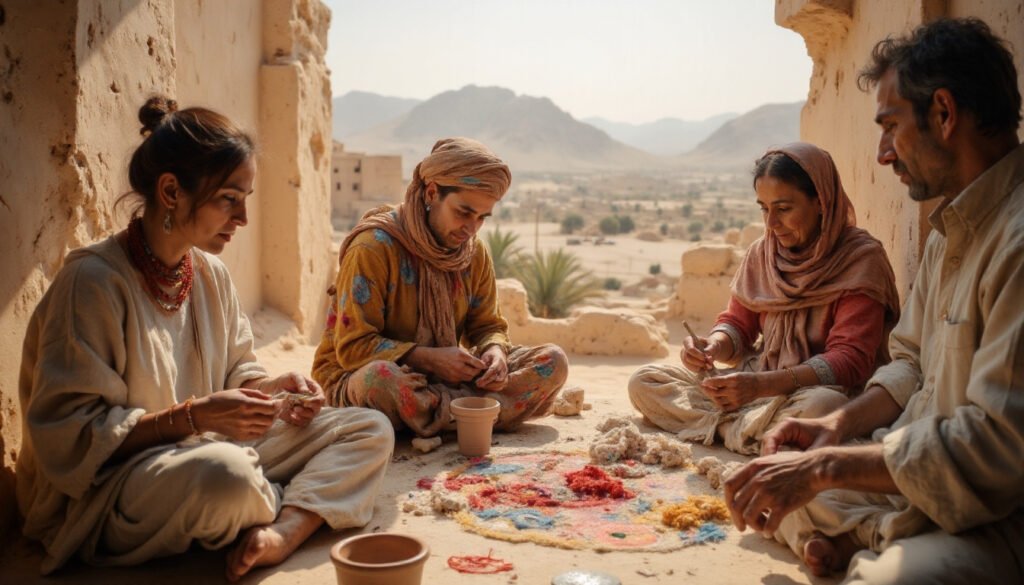
Introduction: Travel with Your Hands and Heart
Have you ever touched a handmade clay pot and felt like you were holding a piece of history? Perhaps you have traced your fingers across intricate embroidery, only to realize it tells the story of an entire culture.
In fact, travel in Jordan isn’t just about what you see — it’s also about what you touch, create, and remember. Beyond Petra’s rose-red stones or Wadi Rum’s silent dunes, there’s a heartbeat that often goes unnoticed: the artisan’s heartbeat. This heartbeat, quiet and steady, is deeply rooted in generations of tradition.
Crafts as Culture: More Than Just Beautiful Objects
Local crafts are more than decorative souvenirs. They are living traditions, passed from grandmothers to daughters, from skilled hands to curious visitors. Each stitch, swirl, and bead is a whisper of history — and when you join a workshop, you become part of that story.
Instead of buying a factory-made keepsake, imagine creating one with your own hands. Picture yourself in a sunlit studio in Madaba, turning clay into a cup you’ll cherish forever. Or learning embroidery in Kerak, as a local woman guides your thread and shares her life story.
These moments aren’t just activities. They are portals into the soul of Jordan.
Why This Matters: A Deeper Kind of Tourism
Hands-on workshops offer something far richer than a photo op. They invite you to slow down, to engage, and to connect — not just with a place, but with its people. You don’t need to be an artist. You just need to be open.
In this article, we’ll guide you through Jordan’s vibrant world of traditional crafts — what you can try, where to go, and how to make the most of these immersive experiences. We’ll explore the stories behind the skills, the communities that keep them alive, and how platforms like YRentNTour.com are revolutionizing cultural tourism by eliminating commissions and supporting local economies.
So, if you’re ready to go beyond sightseeing — to feel Jordan with your hands, and carry home a piece of its soul — keep reading.
This isn’t just a visit.
This is a connection that lingers.
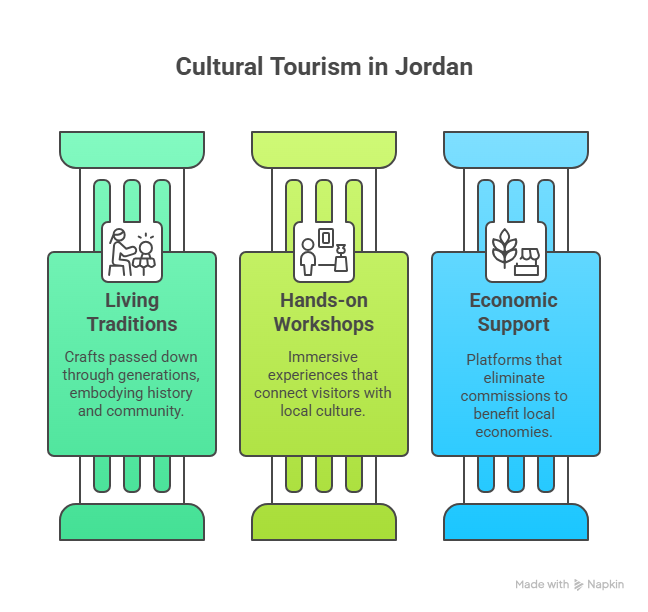
Why Traditional Crafts Are Hidden Treasures for Curious Travelers
Today, most souvenirs are factory-made and mass-produced. But authentic handmade crafts are different. They are a quiet rebellion against fast, impersonal products. Each craft proves that tradition still lives—hand to hand, item by item.
Each piece holds a special meaning. It carries symbols unique to its region. These symbols tell stories about local culture and history. For example, embroidery patterns in northern Jordan are very different from the jewelry styles of the southern Bedouin tribes. This variety makes your experience richer and more meaningful.
Also, every craft tells a story from the past. The skills used, like shaping clay or threading beads, have been passed down for centuries. They connect us to history in a way that words alone cannot. Colors, shapes, and textures speak louder than any guidebook.
Besides that, there is real emotion in each creation. The artisans who make these crafts are proud and patient. They put their heart and soul into their work. When you hold a handmade item, you hold a piece of someone’s passion.
Because of this, joining a workshop or buying directly from artisans means more than just shopping. It helps keep traditions alive and supports the people behind them. This makes your souvenir truly special—it carries memories and meaning.
In short, traditional crafts offer something no mass-made product can: authenticity, history, and human connection. For travelers who want a deeper experience, these treasures are waiting.
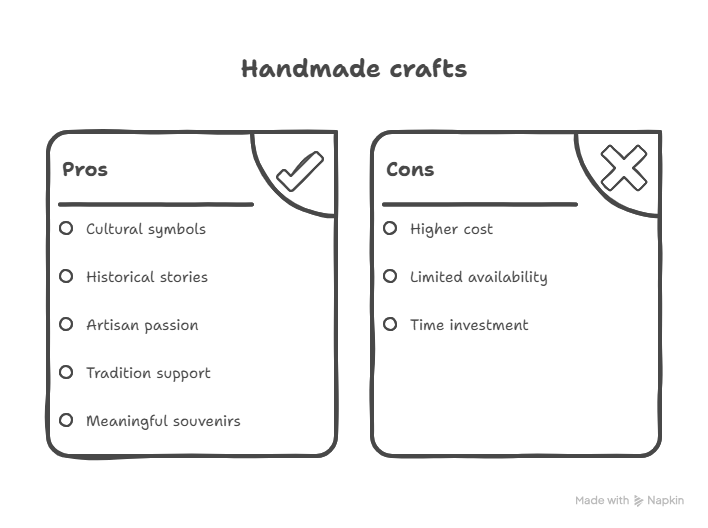
Why It Matters to You
By choosing handmade crafts, you help protect cultural heritage. You also support local communities. This kind of tourism is more sustainable and rewarding.
“Every stitch in a Kerak dress, every swirl on a Madaba pot, tells the story of a people who never forgot who they are.”
— A local artisan from Petra
These aren’t just workshops. They’re bridges between you and a culture that welcomes you in — one thread, bead, and brushstroke at a time.
Popular Jordanian Handicrafts You Can Experience
Embroidery of Pride: Threads That Speak
From the green hills of Ajloun to the dry deserts near Tafilah, embroidery is not dying. It is a living language. Each region in Jordan has its own colors and stitch styles. These patterns often show local plants, animals, and tribal stories.
When you join a workshop, here’s what you will do:
- First, you learn basic and some intermediate stitches. This helps you get comfortable with the craft.
- Next, you discover what the patterns mean. This helps you connect with the culture behind the art.
- Finally, you make your own piece. It can be something to wear or a decorative item. Your creation becomes a memory of your experience.
Also, many workshops are taught by local women who share their stories while you work. So, the workshop is more than just making things. It is about sharing culture through thread.
Embroidery also teaches patience and calm. Many people feel relaxed and inspired after the session. They leave with a handmade item and a new connection to Jordan.
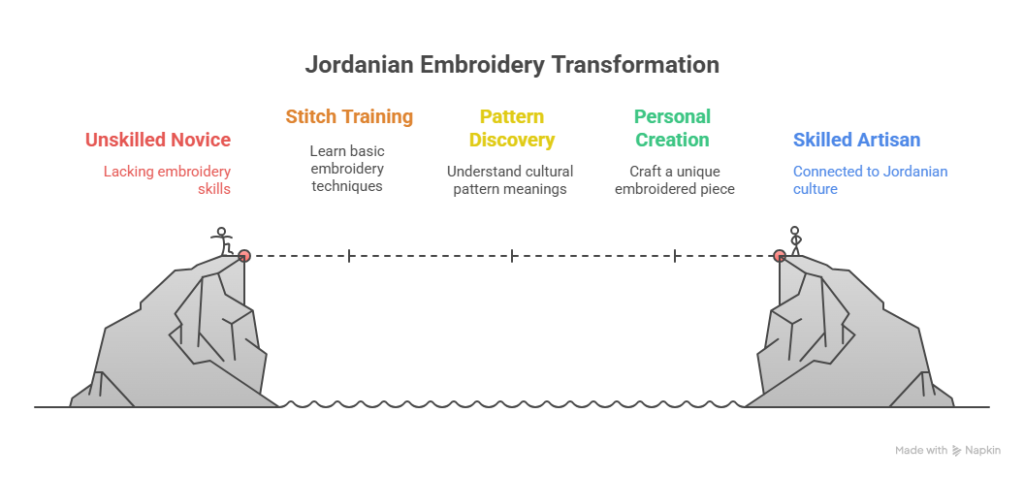
👉 Link suggestion: Explore our embroidery experiences (Internal)
🏺 Pottery: Earth That Speaks
In towns like Madaba, Jerash, and Salt, pottery is more than just a practical craft—it’s a meditative experience. The intimate connection between earth, water, and your hands breathes life into every piece. As you shape the clay, you engage with centuries of tradition that have shaped Jordan’s cultural landscape.
When you join a pottery workshop, you can expect to:
- First, work with raw clay, feeling its cool texture and malleability beneath your fingers. This hands-on contact grounds you in the moment.
- Next, try wheel throwing or hand-building techniques. Both allow you to mold the earth into unique shapes, guided by your own creativity and the instructor’s wisdom.
- Then, you get to paint or glaze your own design, adding personal color and style. This final step transforms your piece from simple clay into art.
Beyond just making pottery, this process offers a kind of therapy. The tactile nature of working with clay encourages mindfulness and calm. Consequently, many participants find the experience deeply relaxing and rewarding.
Moreover, pottery workshops often take place in bright, open studios or heritage houses, surrounded by the rich history of the area. Therefore, the setting itself adds another layer of connection to Jordan’s cultural roots.
In summary, pottery isn’t simply about function; it’s about expression, history, and healing. By the end of your session, you’ll leave not only with a handmade creation but also with a sense of peace and accomplishment.
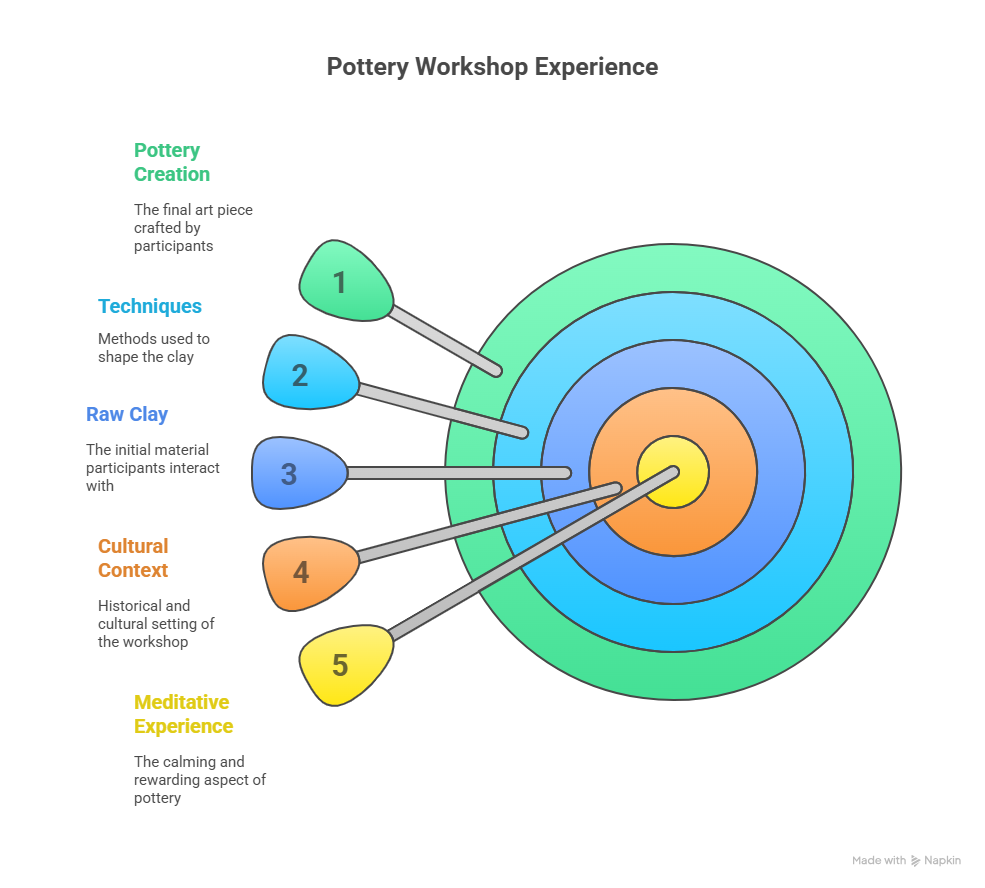
👉 Link suggestion: UNESCO on traditional crafts (External – open in new tab)
🧿Beads & Jewelry: The Desert’s Voice
In regions like Wadi Rum, Ma’an, and Aqaba, Bedouin women create stunning jewelry using volcanic stones, recycled metals, and natural beads. Each piece carries deep stories of migration, love, and the raw beauty of desert life. Their craft is not just decorative — it’s a voice echoing the history and spirit of their people.
When you join a jewelry-making workshop, here’s what to expect:
- To begin with, you will learn traditional bead stringing techniques. These age-old skills have been passed down through generations, reflecting the Bedouin way of life.
- In addition, you’ll explore the symbolism behind tribal jewelry. Each color, shape, and material holds special meaning, often related to protection, identity, or important life events.
- Finally, you will discover how to make prayer beads or necklaces that are both beautiful and meaningful. This hands-on process connects you personally with the stories woven into the craft.
Moreover, the best part is that you get to keep whatever you make. Unlike mass-produced souvenirs, your piece will carry genuine cultural significance and your own personal touch.
Furthermore, these workshops often take place in intimate settings, such as Bedouin tents or local homes. Therefore, you not only learn a craft but also experience authentic hospitality and stories firsthand.
In short, jewelry making here isn’t just an art form — it’s a living tradition that invites you to become part of a larger narrative. By the end of your session, you’ll leave with more than a necklace or bracelet; you’ll carry a piece of the desert’s soul with you.
Where to Join These Workshops (And What to Expect)
| 📍 Location | 🧶 Craft | 👩🏫 Instructor Type |
|---|---|---|
| Kerak | Embroidery, Pottery | Women-led community centers |
| Madaba | Pottery, Mosaics | Master artisans |
| Wadi Rum | Jewelry | Bedouin women co-ops |
| Salt & Jerash | Heritage crafts | Cultural heritage houses |
With YRentNTour, you skip the agencies and connect directly with these communities. Each listing includes:
- 📸 Authentic photos
- ⭐ Real reviews
- 📅 Availability calendar
- 📞 Direct contact with artisans
A Journey of the Senses: Engage More Than Just Your Eyes
Travel often focuses on what you see, but this experience asks you to engage more than just your eyes. In fact, it awakens all your senses.
For starters, you’ll smell the earthy scent of clay drying gently under the warm Jordanian sun. This aroma carries the story of the earth itself.
Next, you’ll feel thread sliding smoothly through traditional fabrics, connecting you directly to the skilled hands that crafted them. This tactile sensation brings history to life in a way few things can.
In addition, your ears will catch the gentle scrape of carving tools shaping intricate designs on mosaic stones. This sound echoes centuries of artistry and dedication.
Moreover, your eyes will feast on colors inspired by Jordan’s diverse landscapes — from the deep reds of desert sands to the vibrant blues of the nearby seas and the lush greens of mountain valleys.
Together, these sensations transform tourism from a passive activity into a deeply personal journey. You don’t just observe culture — you become part of it.
Therefore, by engaging multiple senses, you create memories that linger long after the trip ends. This holistic experience connects you to Jordan in a way that photographs or videos simply cannot capture.
Ultimately, this is travel as it should be: immersive, authentic, and unforgettable.
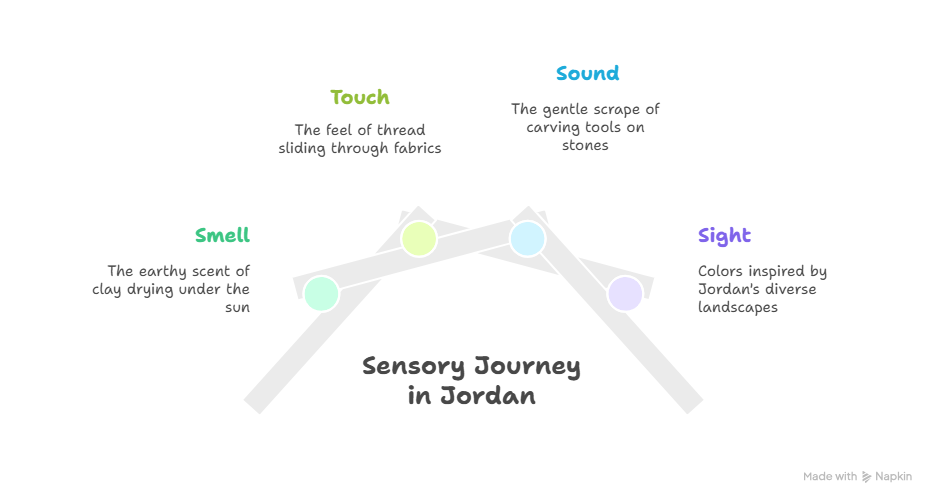
How YRentNTour Powers Real, Grassroots Tourism
Let’s not sugarcoat it — most tourism platforms are middlemen in disguise. But YRentNTour is different by design. It’s a non-commission, community-first, filter-free platform that promotes real local businesses without big-agency drama.
Here’s why it matters:
- ✅ 100% of profits go to artisans
- ✅ You book directly — no tour operator markup
- ✅ You discover real, under-the-radar spots
- ✅ You support independent craftspeople, not big retailers
- ✅ You leave a positive footprint behind
👉 Internal link suggestion: Learn more about YRentNTour’s mission
Real Story: How a Rug Became a Memory
During a recent workshop in Madaba, a tourist from Germany spent three hours embroidering a small rug with a local artisan named Fatima.
“I never thought I’d bring home something I made myself,” he said.
“It’s more than a souvenir — it’s part of my story now.”
These stories aren’t rare. They’re waiting — across Jordan — for someone curious enough to try.
How to Book Your Craft Experience (In 3 Easy Steps)
No calls. No commissions. No third-party apps.
- 🔗 Visit: YRentNTour.com
- 🧵 Go to “Cultural Experiences & Workshops”
- 📅 Filter by location or date — and book directly
✨ You’ll get instant confirmation from the artisan themselves — not some office bot.
Conclusion: Don’t Just Visit Jordan… Touch It
Long after your flight takes off, you might not remember every ancient stone or towering castle. However, some moments will stay with you forever.
For instance, you’ll remember the smell of paint drying in a pottery studio, a scent that carries the soul of creation.
Moreover, the laughter shared with a Bedouin artisan will echo in your heart, reminding you that travel is about people, not just places.
In addition, there is the pride you feel when you take home something made by your own hands — a piece crafted under the guidance of someone who has lived and breathed the craft for years.
Therefore, this is Jordan in its truest form — not through a screen, brochure, or quick snapshot, but through your senses and your personal connection.
That’s why YRentNTour stands for more than tourism:
🌍 Authentic experiences that immerse you in culture
👫 Human connection that bridges worlds
🧵 Cultural continuity that preserves tradition
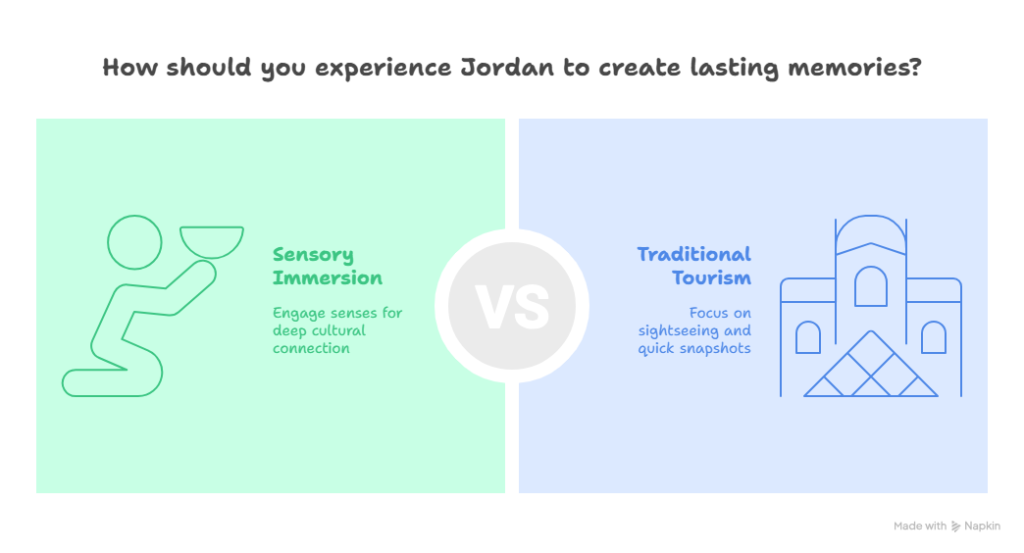
So, don’t just visit Jordan — engage with it, create within it, and carry its story with you.
Finally, book your workshop today and make your trip to Jordan a story worth telling for a lifetime.retelling.

Comments